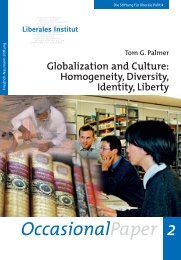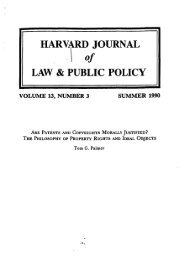242 Critical Review Y,l. 12, No. 3It would require too l<strong>on</strong>g a digressi<strong>on</strong> to offer a full critique ofwhat is wr<strong>on</strong>g with blaming the victims of communism for failing tolive up to its “high” moral st<strong>and</strong>ards. I will merely suggest an hypoth-esis that seems simpler <strong>and</strong> more straightforward than the claim thathuman beings have not yet proven good enough for socialism: social-. ism is not good enough for human beings. .<str<strong>on</strong>g>Cohen</str<strong>on</strong>g> errs in thinking that rati<strong>on</strong>al parties would never refuse towork or bargain or allow their abilities to decay if they were notcompensated unequally. He simply dismisses the possibility: “Nolibertarian would want to defeat the Ablehfirm argument (for thec<strong>on</strong>sistency of equality <strong>and</strong> self-ownership) <strong>on</strong> so adventitious abasis” (<str<strong>on</strong>g>Cohen</str<strong>on</strong>g> r995,97). According to <str<strong>on</strong>g>Cohen</str<strong>on</strong>g> (ibid., 97-98), the libertarian“would want, instead, to overcome it by pressing . , , [a]more fundamental objecti<strong>on</strong> , . . that to affirm joint ownership ofthe world is, as the story of Able <strong>and</strong> Infirm might be thought toshow, inc<strong>on</strong>sistent with achieving the purpose <strong>and</strong> expected effectof self-ownership.” But <str<strong>on</strong>g>Cohen</str<strong>on</strong>g>’s hypothetical opp<strong>on</strong>ent need notchoose <strong>on</strong> which basis to refute <str<strong>on</strong>g>Cohen</str<strong>on</strong>g>’s arguments, for theAble/Infirm story does not show what <str<strong>on</strong>g>Cohen</str<strong>on</strong>g> claims that it shows,<str<strong>on</strong>g>Cohen</str<strong>on</strong>g> has not dem<strong>on</strong>strated that joint owners would not or shouldnot agree to divisi<strong>on</strong> of their assets; nor that the distributi<strong>on</strong> of asurplus over what is necessary to sustain both Able <strong>and</strong> Infirm mustbe evenly divided; nor that Able couId not bargain for a greatershare <strong>on</strong> the basis of a threat to diminish her productivity or herproductive effort. Finally, real-world experience with joint ownershipc<strong>on</strong>tradicts <str<strong>on</strong>g>Cohen</str<strong>on</strong>g>’s rosy egalitarian descripti<strong>on</strong> <strong>and</strong> raises theissue of why joint ownership should ever be seriously c<strong>on</strong>sidered inthe first place.*. 1’:.*t :z .:.i...!. r: .i’I?.i-
<strong>Palmer</strong> <str<strong>on</strong>g>Cohen</str<strong>on</strong>g> <strong>on</strong> <strong>Property</strong> <strong>and</strong> Equality 243may be, but why must or should they be? Classical liberals <strong>and</strong> libertariansare open <strong>on</strong> the questi<strong>on</strong> of whether particular bits of l<strong>and</strong> orother resources should be c<strong>on</strong>sidered jointly or individually owned.15What is unatgued for by <str<strong>on</strong>g>Cohen</str<strong>on</strong>g> (aside fiom asserting that it is “intuitivelyrelevant”), but is of dubious plausibility, is the idea that everyresource other than our own pers<strong>on</strong>s should be c<strong>on</strong>sidered the jointproperty of all human beings, or perhaps of all rati<strong>on</strong>al agents. If rati<strong>on</strong>alagents were to be discovered <strong>on</strong> Mars, would the joint ownersof Earth be required to obtain the permissi<strong>on</strong> of every rati<strong>on</strong>al Martianbefore any terrestrial resource might be used, <strong>and</strong> would theagreement have to be unanimous across species? This would be astrange basis <strong>on</strong> which to build a theory of jurisdicti<strong>on</strong> over scarceresources. As almost all previous writers <strong>on</strong> property have emphasized,requiring the permissi<strong>on</strong> of every<strong>on</strong>e before any<strong>on</strong>e could pickan apple would result in the extincti<strong>on</strong> of humanity. Joint ownership. requiring unanimous approval to every act of transformati<strong>on</strong> of resourcesis ultimately rejected by <str<strong>on</strong>g>Cohen</str<strong>on</strong>g>, <strong>on</strong> the ground that it interfereswith any reas<strong>on</strong>able sense of aut<strong>on</strong>omy, but it is not clear why itshould even be entertained in the first place.There may be good reas<strong>on</strong>s to believe that very early in its actualhistory, property took <strong>on</strong>e of various forms of positive community,principally familial, as Fustel de Coulanges (1864), Maine (1888), <strong>and</strong>other anthropologists <strong>and</strong> historians of property have shown; but thatis not <str<strong>on</strong>g>Cohen</str<strong>on</strong>g>’s argument. Nor are the forms of positive communitydescribed by legal historians c<strong>on</strong>sistent with the egalitarian ownershipdescribed by <str<strong>on</strong>g>Cohen</str<strong>on</strong>g> as “joint ownership,” for they did not encompassall humans or all rati<strong>on</strong>al agena, but were always forms of communitythat established rights against all n<strong>on</strong>members ofthe owning communities.As Locke noted of comm<strong>on</strong> property, “And though it be comm<strong>on</strong>,in respect of some Men, it is not so to all Mankind, but is thejoint property of this Country, or this Parish” (Zuo nedises, 11.35). Inthis respect, “negative community~’ i.e., the idea that all have a rightto appropriabe unowned objects, is a far more egalitarian startingpoint than any form of “positive community,”which in every formever observed was a n<strong>on</strong>universal, group-limited right. This issue wascarefully c<strong>on</strong>sidered by the modern natural-law writers <strong>on</strong> property,who distinguished between negative community <strong>and</strong> positive community,the latter corresp<strong>on</strong>ding to the joint ownership that <str<strong>on</strong>g>Cohen</str<strong>on</strong>g>proposes as the pmper baseline.16It is remarkable that figures such as <str<strong>on</strong>g>Cohen</str<strong>on</strong>g> persistently overlook
- Page 1 and 2: Tom G. PalmerG. A. COHEN ON SELF-OW
- Page 4 and 5: 3238 Critical Review VoL 12, No. 3q
- Page 6 and 7: 230 Critical Review Vol. J2, No. 3d
- Page 8 and 9: 232 Critical Review Vol. 12, No. 3w
- Page 10: 234 Critical Review Vol.12, No. 3iv
- Page 14 and 15: .238 Crltical Review Vol. 12, No. 3
- Page 16 and 17: 240 Critical Review Vol. 12, No. 3o
- Page 20 and 21: 244 Critical Review Vol. 12, No. 3t
- Page 22 and 23: 246 Critical Review Val. 12, No. 32
- Page 24 and 25: 248 Critical Review Yo(. 12, No. 3e
- Page 26 and 27: as0 Critical Review Vol. la, No. 3.











